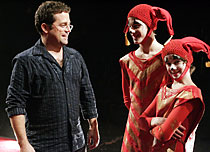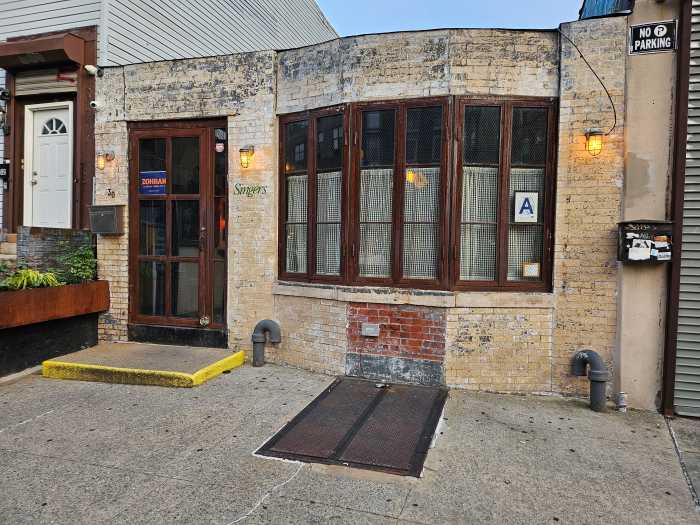Staging Shakespeare’s highly charged political
play "Richard III" – with its duplicitous ruler lusting
after more power at the expense of his trusting subjects – is
another example of the Bard’s continued relevance, according
to Prospect Heights resident Peter DuBois, who directs the play
now onstage at the Public Theater in Manhattan.
"Actually, Shakespeare is more relevant today than he was
in his own time," said the 34-year-old who, after heading
a theater in Juneau, Alaska for five years, is now an associate
producer at the Public. "We know how power is manipulated.
Then, they didn’t have access to power that we do. So it’s fascinating
that, 400 years later, Shakespeare is right on the money."
Of course, that doesn’t mean DuBois’ "Richard III"
is set at 1600 Pennsylvania Ave.
"It’s like Arthur Miller said when he did ’The Crucible,’
which he wrote about McCarthyism: he needed to go back to the
Salem witch trials to tell that story," said DuBois. "With
’Richard,’ it’s more interesting to create the parable instead
of pointing out the obvious: how close it is to present-day Washington.
You say to yourself while watching, ’History hasn’t changed –
nothing’s changed.’"
DuBois has more pressing issues in his first-ever Shakespearean
staging at the Public, especially his decision to cast the dwarf
Peter Dinklage – star of Tom McCarthy’s 2003 award-winning film
"The Station Agent" – in the title role.
"I was talking with a friend, an L.A.-based playwright in
a wheelchair," said DuBois. "And we talked about how
Richard is always played by a good-looking guy who becomes this
person with a hump, and how great it would be if we could cast
a disabled actor. And Peter [Dinklage] had said in an interview
that he’d like to play Richard, and George Wolfe [producer of
the Public Theater] saw that and contacted him.
"Meanwhile, I wanted to do ’Richard’ at the Public, and
George told me about Peter’s interest, so it seemed fated that
we’d do this project together."
DuBois was impressed by Dinklage’s performance in "The Station
Agent" but had to make sure he could undertake the rigors
of playing one of Shakespeare’s most difficult villains onstage.
"There was a workshop process before we cast the show, and
we worked with [Dinklage] for a full week before we cast him,"
DuBois recalls. "We did the workshop to see what it would
be like – since you always build a production of ’Richard’ around
the leading actor, we went through this exciting process of seeing
Peter in the role and seeing how charismatic he is, and how effortless
the quality of his acting is. He feels real empathy for the character."
Dinklage’s commanding presence as Richard is underscored by his
physical stature: his strength and power come from within, and
his lack of height is never a handicap; on the contrary, it becomes
part of his stranglehold on the other characters and, by extension,
the throne of England.
"There are moments when you can forget about his height
because he’s such a great actor," said DuBois. "At
times he manipulates his height: he talks about how he’s half
of Edward, which in the text, means something like lacking looks
or generosity of spirit, but here it’s his size.
"We also play with lighting and shadows, and it’s fun seeing
him taking down these men who are much larger than he is,"
he said. "What’s thrilling about Peter is he’s the anti-Olivier
Richard; [Sir Laurence] Olivier played up the melodramatic villainy,
while Peter plays with the fun of it, how crazy and mad power
can become. What’s great about Peter is his comic timing: the
play hinges on the audience wanting to go on this ride with Richard,
and Peter gets them to do that."
An early scene testing both director and actor is Richard’s confrontation
with lovely Lady Anne – whose father and husband he’s killed
– and slowly, methodically transforming her from grieving widow
to his future wife and queen.
"When she says, ’Thou dost infect mine eyes,’ it could mean
several things," said DuBois.
"It’s very important that she’s grieving for her husband
and father alone, and so her decision to be with Richard is not
because she’s in love with him, but because everyone she loves
is dead and Richard takes advantage of her vulnerability. And
Peter’s so charming as an actor and as this character that he
can play off that."
DuBois also imagined a riveting "coup de theatre" to
begin the play: a wordless tableau set to the sweeping music
of Bedrich Smetana’s nationalist tone poem, "Ma Vlast."
"I wanted to create this stew of emotions at the beginning
that introduces the characters," said DuBois.
"You can see the discontent beginning among the people,
and Richard only needs to push a little bit to throw this entire
world into disarray."
"Richard III" is at the Public
Theater, 425 Lafayette St. at East Fourth Street in Manhattan,
through Oct. 24. Showtimes are Tuesdays through Saturdays at
8 pm, and Saturdays and Sundays at 2 pm. In addition, there are
performances Oct. 13 at noon, and Oct. 20 at 2 pm.
Tickets are $50, and are on sale at The Public Theater box office,
on-line at www.publictheater.org;
and via Tele-charge, (212) 239-6200. Quik Tix, discounted rush
tickets, are sold to the general public when available one half-hour
before curtain time to any non sold-out performance.

























